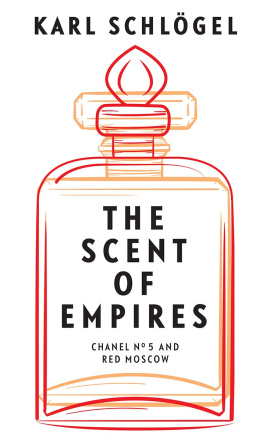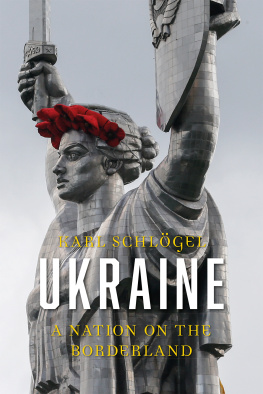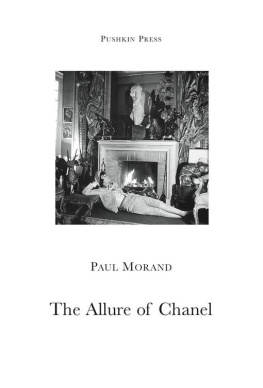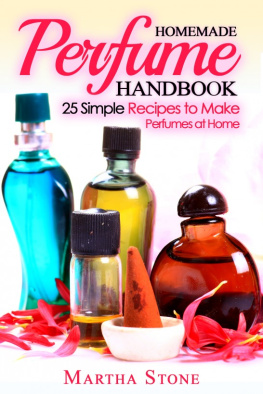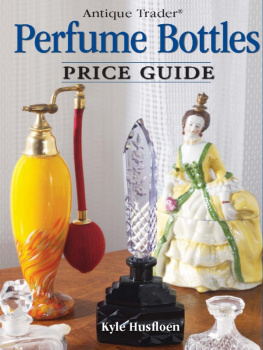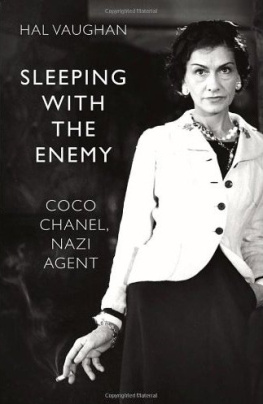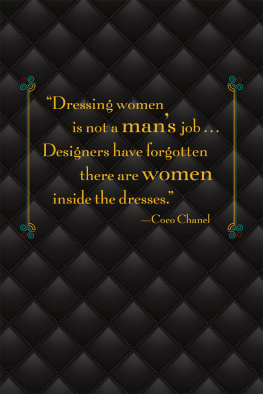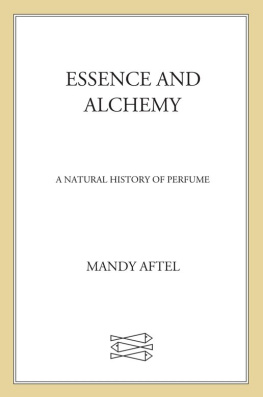
The Scent of Empires
Chanel No. 5 and Red Moscow
Karl Schlgel
Translated by Jessica Spengler
polity
Originally published in German as Der Duft der Imperien. Chanel No 5 und Rotes Moskau by Karl Schlgel 2020 Carl Hanser Verlag GmbH & Co. KG, Mnchen
This English edition 2021 by Polity Press

The translation of this work was supported by a grant from the Goethe-Institut.
Polity Press
65 Bridge Street
Cambridge CB2 1UR, UK
Polity Press
101 Station Landing
Suite 300
Medford, MA 02155, USA
All rights reserved. Except for the quotation of short passages for the purpose of criticism and review, no part of this publication may be reproduced, stored in a retrieval system or transmitted, in any form or by any means, electronic, mechanical, photocopying, recording or otherwise, without the prior permission of the publisher.
ISBN-13: 978-1-5095-4660-2
A catalogue record for this book is available from the British Library.
Library of Congress Cataloging-in-Publication Data
Names: Schlgel, Karl, author. | Spengler, Jessica, translator.
Title: The scent of empire : Chanel no. 5 and Red Moscow / Karl Schlgel ; translated by Jessica Spengler.
Other titles: Duft der Imperien. English
Description: Medford : Polity Press, 2021. | Includes bibliographical references and index. | Summary: How the turbulent history of the 20th century can be read in a vial of perfume-- Provided by publisher.
Identifiers: LCCN 2020051784 (print) | LCCN 2020051785 (ebook) | ISBN 9781509546596 (hardback) | ISBN 9781509546602 (epub)
Subjects: LCSH: Perfumes--Social aspects. | Perfumes--History--20th century. | Perfumes industry--History--20th century. | Manners and customs--History--20th century. | Civilization, Modern--20th century.
Classification: LCC GT2340 .S3713 2021 (print) | LCC GT2340 (ebook) | DDC 391.6/3--dc23
LC record available at https://lccn.loc.gov/2020051784
LC ebook record available at https://lccn.loc.gov/2020051785
The publisher has used its best endeavours to ensure that the URLs for external websites referred to in this book are correct and active at the time of going to press. However, the publisher has no responsibility for the websites and can make no guarantee that a site will remain live or that the content is or will remain appropriate.
Every effort has been made to trace all copyright holders, but if any have been overlooked the publisher will be pleased to include any necessary credits in any subsequent reprint or edition.
For further information on Polity, visit our website: politybooks.com
Dedication
In memory of Karl Lagerfeld (19332019)
Extracurricular activity
It was never my plan to delve into the world of smells and scents, much less perfumes. Like anyone who crossed the border at Friedrichstrasse in Berlin before the Wall fell, I knew that the divided worlds of East and West were divided olfactory worlds as well. But other substances and subjects topped my academic agenda. I had no project in mind, no intention of trying to fill a research gap or produce evidence of a new turn in cultural studies. My understanding of the world of fragrance was modest at best, probably in keeping with the average experience of a man who knows the bare minimum about soaps, deodorants, creams and colognes. My contact with this world was marginal and occasional, occurring only when I traversed the perfume section of a department store (usually on the ground floor and almost impossible to avoid) or passed the inevitable duty-free shops in the airport on the way to my gate. What captured my attention was not so much the scent, or the peculiar mlange of scents, but rather the light and sparkle of crystal, the rainbow of colours, mirrors and glass, and the perfect make-up of the women who were not staff or salespeople here but models, living embodiments of elegance. This glittering world with its endless gradations of colour and nuance always felt very alien to me.
And yet, I had a strong urge to overcome my scruples and venture into this special universe, even without prior knowledge of it. It is an act of self-empowerment, in a way, to take the liberty of writing on a topic you previously knew almost nothing about. Any concerns were overridden by an initial impulse that proved to be more than just a fleeting impression. This impulse was to follow a trail in the kind of pursuit that develops its own drive, its own pull, which is not exhausted and extinguished until the trail has been uncovered and the story has been told.
In the beginning was a scent. It filled the air on every festive occasion in the Soviet Union at the Moscow Conservatory, in the Bolshoi Theatre, at graduation ceremonies and weddings. The somewhat sweet, heavy aroma came to be associated in my mind with fairly staid crowds, polished parquet floors, luminous chandeliers, audience members circulating the theatre foyer during intermissions. I encountered this scent later on as well, in East Germany, usually at official receptions, in the context of GermanSoviet meetings and at officers clubs. My original thought was to track down the scent, maybe find out the brand name. Everything else just fell into place after that.
My initial research revealed that the scent was a perfume by the name of Red Moscow. We know the story of the wildly successful Chanel No. 5, but few know the history of the most popular Soviet perfume. As it turns out, both fragrances can be traced back to a common origin, a composition created by French perfumers in the Russian Empire, one of whom Ernest Beaux returned to France after the Russian Revolution and Civil War and met Coco Chanel, while the other Auguste Michel stayed in Russia, helped to establish the Soviet perfume industry and used a perfume known as Le Bouquet Favori de lImpratrice as the basis for Red Moscow. Both perfumes represent the birth of new worlds of fragrance, radically different life stories, the cultural milieus of Paris and Moscow in the first half of the twentieth century, and the seductive scent of power that permeated two careers: that of Coco Chanel, who became involved with the Germans in occupied Paris, and that of the lesser-known Polina Zhemchuzhina, wife of Soviet Foreign Minister Vyacheslav Molotov and a peoples commissar in her own right, who, for a time, was responsible for the entire Soviet cosmetics and perfume industry. Coco Chanel temporarily settled in Switzerland after the war, while Polina Zhemchuzhina-Molotova was caught up in the antisemitic campaigns of the late 1940s and spent five years in exile, where she experienced the smell of the camps. Chanel achieved success in the Parisian fashion scene of the 1950s, while Zhemchuzhina lived in seclusion with her husband in Moscow and remained a fervent Stalinist until her death in 1970. And a side track in my research led to the grande dame of German film, Olga Chekhova, who was also a trained cosmetologist.
As popular as the perfume Red Moscow may have been, it had little way of countering the stagnation of the late Soviet Union and pressure of the global fragrance industry. But it returned to the market in post-Soviet Russia, and its very existence much like the passion of those who collect perfume bottles has become emblematic of a peculiar search for lost time. Such a search is bound to turn up startling revelations, not least that the Russian avant-gardist Kazimir Malevich (anonymously) designed the bottle for the Soviet Unions best-selling eau de toilette before going on to paint
Next page
